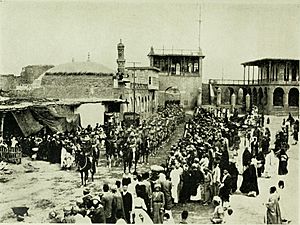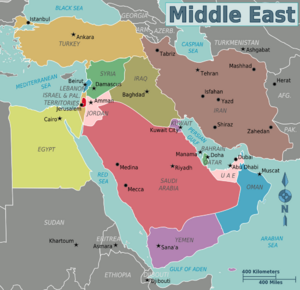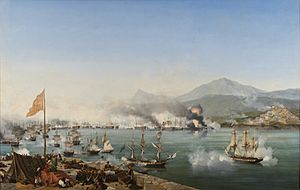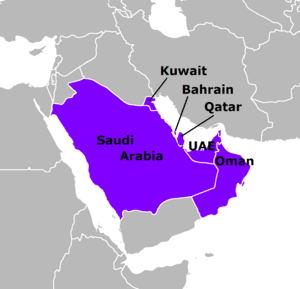British foreign policy in the Middle East facts for kids
British foreign policy in the Middle East has been important for a long time, especially over the last 250 years. Britain had several key goals. These included keeping its path open to British India, stopping Russia or France from threatening that path, and protecting the Suez Canal. Britain also supported the weakening Ottoman Empire against Russian threats and made sure it had oil supplies after 1900 from Middle Eastern oil fields. It also protected its own lands in the Middle East, like Egypt, and kept its strong naval presence in the Mediterranean Sea.
These policies were important from the 1770s, when Russia started to control the Black Sea, all the way to the Suez Crisis in the mid-1900s and even the Iraq War in the early 2000s. They are a big part of the history of the foreign relations of the United Kingdom.
Contents
Napoleon's Challenge
Napoleon, the French leader, fought wars against Britain from the late 1790s to 1815. He sent a large army to Egypt, which was part of the Ottoman Empire. British businesses, especially the Levant Company, had a strong presence in Egypt.
Britain fought back. In 1798, the British navy sank the French fleet at the Battle of the Nile. This trapped Napoleon's army in Egypt. Napoleon managed to escape, but the army he left behind was defeated by the British. The remaining French soldiers returned home in 1801.
Later, in 1807, Britain was at war with the Ottomans. Britain sent troops to Alexandria, Egypt. But the Egyptians, led by Mohammed Ali, defeated the British, who then left. By 1825, Britain's government took over the work of the Levant Company.
Greece Fights for Freedom: 1821–1833
The 1820s were mostly peaceful in Europe, but the Greek War of Independence was a big conflict. Serbia had already gained some freedom from the Ottoman Empire in 1815. The Greeks started their own rebellion in 1821, with some help from Russia.
The Greeks had smart thinkers and business people who used ideas from the French Revolution to gain support in Western Europe. Even though the Ottomans fought back harshly, the rebellion continued. Famous people like the British poet Lord Byron helped turn British public opinion in favor of the Greeks.
However, top British leaders like George Canning and Viscount Castlereagh were more careful. They thought the Ottoman Empire was "barbaric" but also necessary. Until 1914, Britain's main goal was to keep the Ottoman Empire strong, especially against Russia. But if the Ottomans treated Christians very badly, Britain demanded changes.
Russia wanted to expand its power as the Ottoman Empire weakened. Other European countries saw Russia's plans as a big threat. Britain and France worried about Russia acting alone to help the Greeks. So, they made a treaty with Russia in 1827. They agreed to work together to make the Ottoman government give Greece some freedom, while still keeping the Ottoman Empire mostly intact.
The three powers sent their navies to Greece. In the Battle of Navarino, the Allied navies won a big victory over the Ottomans and their Egyptian allies. This saved the new Greek Republic from falling apart. But Greece needed more help. Russia fought the Ottomans in 1828–29, and France sent troops to Greece. These actions finally secured Greece's independence.
Greek nationalists then had a "Great Idea." They wanted their small nation to grow and include all the millions of Greek Orthodox people living under Ottoman rule, with Constantinople as their capital. Britain opposed this idea because it wanted to keep the Ottoman Empire together. This "Great Idea" finally ended in 1922 when Turkey drove the Greeks out of Anatolia.
Crimean War
The Crimean War (1853–1856) was a major conflict fought in the Crimean Peninsula. The Russian Empire lost to an alliance of Britain, France, and the Ottoman Empire. The immediate reasons for the war were small. The bigger reasons involved the weakening Ottoman Empire and Russia misunderstanding Britain's position.
Tsar Nicholas I visited London and talked with British Foreign Secretary Lord Aberdeen. The Tsar wanted to know what would happen if the Ottoman Empire broke apart. He thought Britain would support Russia's plans. But Britain, like France, did not want the Ottoman Empire to break up, especially if Russia gained more power.
When Lord Aberdeen became Prime Minister in 1852, the Tsar mistakenly thought he had Britain's approval to attack Turkey. He was shocked when Britain declared war. Aberdeen had been against the war, but public opinion demanded it, and he was forced to resign. The new Prime Minister, Lord Palmerston, strongly opposed Russia. He saw the war as a fight for British values like liberty and free trade.
Most of the fighting happened in the Crimean Peninsula and the Black Sea. Both sides struggled, and many soldiers died from disease. In the end, the British-French alliance won, and Russia lost control of the Black Sea. However, Russia regained control of the Black Sea in 1871.
The war showed the importance of efficiency and progress. Florence Nightingale, a nurse, became a hero for bringing scientific methods to care for sick and dying British soldiers.
Britain Takes Control of Egypt, 1882
Britain and France had strong interests in Egypt because of the Suez Canal. Most ships using the canal were British. In 1881, a nationalist movement called the ʻUrabi revolt began. It was led by Ahmed ʻUrabi against Khedive Tewfik, who worked closely with Britain and France.
Egypt's finances were in chaos, and the Suez Canal was threatened. Britain felt it had to act to protect its interests and reputation. So, Britain decided to use force, but France did not join them. On July 11, 1882, Prime Minister William E. Gladstone ordered the bombardment of Alexandria. This started the short Anglo-Egyptian War of 1882.
Egypt officially remained part of the Ottoman Empire, but British officials made the real decisions. The British Consul-General, Evelyn Baring, 1st Earl of Cromer, took full control of Egypt's economy. He had experience from British India and used similar methods. Britain promised many times to leave Egypt in a few years. It made this promise 66 times until 1914, when it took permanent control.
Historians have debated why Gladstone, who was usually against imperialism, decided to take over Egypt. Some say it was to protect the Suez Canal from chaos and a nationalist revolt. Others argue it was to protect the money British investors had put into Egypt. Another view is that it was to show British strength and prestige in Europe and India.
Armenia
The leaders of the Ottoman Empire had long been unfriendly towards their Armenian people. During World War I, they accused Armenians of supporting Russia. This led to a forced relocation of Armenians, where hundreds of thousands died in what is known as the Armenian genocide.
Since the late 1870s, Britain, led by Gladstone, had spoken out against these harsh policies and terrible acts. Britain helped to raise awareness around the world. From 1878 to 1883, Germany also followed Britain's lead, asking the Ottoman Empire to make reforms to improve the lives of the Armenian minority.
Persian Gulf
In 1650, British diplomats signed a treaty with the Sultan of Oman, promising a strong bond between the two nations. Britain wanted to increase its presence in the Persian Gulf region, using Oman as a base. British companies like the Levant Company and later the East India Company helped with this.
When Napoleon threatened Egypt in 1798, Britain strengthened its ties with the Arab states of the Persian Gulf. It pushed out French and Dutch rivals and gave the East India Company more diplomatic power. The East India Company also expanded its relationships with other local rulers and into southern Persia (modern-day Iran). Russia was also active in northern Persia, leading to some tension.
These agreements gave Britain control over mineral resources. In 1908, oil was discovered in Persia. The Anglo-Persian Oil Company (which later became BP) started drilling. This oil became the main fuel for the Royal Navy's new diesel engines, which were replacing coal-powered steam engines. Oil was better because warships could carry enough fuel for long trips without needing to stop often for coal.
Aden
When Napoleon threatened British access to India in 1798, the East India Company made a deal with the Sultan of Aden. This gave Britain rights to a deepwater harbor on Arabia's southern coast, which was important for refueling ships. The East India Company took full control in 1839.
When the Suez Canal opened in 1869, Aden became even more important for trade and military strategy. To protect it from the Ottoman Empire, the East India Company made agreements with local leaders in the surrounding areas. By 1900, Britain had absorbed these territories.
Local people wanted independence, so in 1937, Aden became a Crown Colony, separate from India. Nearby areas became the Western and Eastern Aden Protectorates. About 1,300 local leaders signed agreements and kept their power. They resisted demands from labor unions and the threat of Yemen taking over their lands.
London saw its military base in Aden as vital for protecting its oil interests in the Persian Gulf. But costs grew, budgets were cut, and Britain misunderstood the growing conflicts inside Aden. In 1963, the Federation of South Arabia was formed, combining the colony and 15 protectorates.
Independence was announced, leading to the Aden Emergency, a civil war. In 1967, the British government withdrew its forces from Aden. The National Liberation Front quickly took power and created a communist state called the People’s Republic of South Yemen, which had close ties to Moscow.
World War I
The Ottoman Empire joined World War I on the side of Germany, becoming an enemy of Britain and France. The Allies launched four major attacks on Ottoman lands. The Gallipoli Campaign (1915–1916) to control the Straits failed. The first Mesopotamian campaign to invade Iraq from India also failed.

However, the second Mesopotamian campaign captured Baghdad in 1917. The Sinai and Palestine campaign from Egypt was a British success. By 1918, the Ottoman Empire was losing the war. It signed an agreement in late October that was basically a surrender.
After the War: Iraq
The British captured Baghdad in March 1917. In 1918, Baghdad was joined with Mosul and Basra to form the new nation of Iraq. This was done under a League of Nations Mandate, meaning Britain would govern it temporarily.
Experts from India helped design the new system, which favored direct British rule. They didn't trust local Arabs to govern themselves. Old Ottoman laws were replaced with new ones based on Indian practices. The Indian rupee became the currency. The army and police were staffed with Indians who had been loyal to the British Raj in India.
A large Iraqi revolt of 1920 was crushed in the summer of 1920. But it greatly encouraged Arab nationalism. In 1925, the Turkish Petroleum Company got the sole right to explore and produce oil in Iraq. Important oil reserves were found in 1927. The company's name changed to the Iraq Petroleum Company (IPC) in 1929. It was owned by British, French, Dutch, and American oil companies and run by the British until Iraq took control of it in 1972.
Britain ruled Iraq under the League of Nations mandate from 1918 to 1933. Iraq gained official independence in 1933, but Britain still had a very strong influence.
World War II
Iraq During WWII
The Anglo–Iraqi War (May 2–31, 1941) was a British military effort to regain control of Iraq and its important oil fields. Rashid Ali al-Gaylani had taken power in 1941 with help from Nazi Germany. The British campaign led to Rashid Ali's government falling, Britain re-occupying Iraq, and the return of Prince 'Abd al-Ilah, a British ally, as Regent of Iraq.
From 1941 to 1945, Britain launched a big campaign in Iraq to promote democracy. It encouraged Iraqi youth to feel pride in their country and warned against growing communist influence. They often used ideas from the Atlantic Charter by Churchill and Roosevelt. However, leftist groups used these same ideas to demand that Britain leave Iraq. Pro-Nazi messages were stopped. This mix of democracy promotion, Iraqi reform movements, and demands for British withdrawal led to big political changes after the war.
In 1955, the United Kingdom joined the Baghdad Pact with Iraq. King Faisal II of Iraq visited Britain in July 1956. Britain hoped that making Iraq more modern and increasing its wealth from oil would solve its problems of unrest. The idea was that more wealth would reach everyone and prevent a revolution. However, the wealth from oil mostly stayed with the elite. Iraq's system allowed corrupt politicians and rich landowners to stay in power. Very little of the vast wealth reached the people, and unrest continued to grow. In 1958, the king and politicians were overthrown in a violent nationalist army revolt.
Suez Crisis of 1956
The Suez Crisis of 1956 was a major disaster for British and French foreign policy. It greatly reduced Britain's role in the Middle East because the United States strongly opposed it. The crisis began in late 1956 when Israel, then Britain and France, invaded Egypt. Their goals were to regain control of the Suez Canal and remove Egyptian president Gamal Abdel Nasser, who had taken control of the canal.
After fighting started, strong political pressure and economic threats from the United States, along with criticism from the Soviet Union and the United Nations, forced the three invaders to withdraw. This event embarrassed the United Kingdom and France and made Nasser stronger.
The Egyptian forces were defeated, but they blocked the canal, stopping all shipping. The three allies had achieved some military goals, but the canal became useless. U.S. president Dwight D. Eisenhower had warned Britain not to invade. He threatened to harm the British financial system by selling US government bonds in British pounds. The Suez Canal was closed from October 1956 to March 1957, costing British shipping companies a lot of money. Historians agree that this crisis "marked the end of Great Britain's role as one of the world's major powers."
End of Influence "East of Suez"
After 1956, the idea of Britain having a big role "East of Suez" (meaning in Asia and the Middle East) became less true. Countries like India, Malaya, and Burma gained independence. This meant Britain had less power and fewer military or economic resources to use in those regions. Hong Kong was growing in importance, but it didn't need military force. Both major British political parties agreed to cut defense spending and focus more on Europe and NATO. So, British forces were reduced "East of Suez."
See also
- History of the Middle East
- Russia–United Kingdom relations
- Egypt–United Kingdom relations
- France–United Kingdom relations
- Iran–United Kingdom relations
- Iraq–United Kingdom relations
- Israel–United Kingdom relations
- Foreign relations of the Ottoman Empire
- Turkey–United Kingdom relations
- International relations, 1648–1814
- International relations of the Great Powers (1814–1919)
- Diplomatic history of World War I
- International relations (1919–1939)
- Diplomatic history of World War II
- Cold War
- Military history of the United Kingdom
- United States foreign policy in the Middle East




